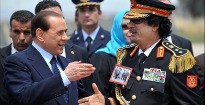How Qaddafi Punked Italy
 Maurizio Molinari writes at ForeignPolicy.com:
Maurizio Molinari writes at ForeignPolicy.com:
In each of my three conversations with Col. Muammar al-Qaddafi throughout the 1990s, one theme prevailed: the Libyan leader's contempt for my country. Listening to his verbose condemnation of Italian colonialism was the price I paid to ask my own questions -- no matter the supposed topic of the interview. In one encounter, in the middle of the night under a tent in the Sirte desert, he bemoaned Libya's exploitation at Italian hands; at noon near the sand dunes just outside Tripoli, he blamed his country's troubles on Rome. Now, with his regime on edge, he is again blaming outsiders for Libya's ills. The protests, he said in a Feb. 22 address, were sparked by malevolent foreigners who were giving the demonstrators drugs. He accused the Italians -- along with the Americans -- of having delivered shoulder-launched rocket-propelled grenades to the rebel forces.
Given all this, you might find it odd -- as I still do -- that Qaddafi's closest European ally is, or was until very recently, none other than the Italian government. During his four decades of rule, the colonel managed to convince Italian leaders not only that their country owed Libya a historical debt, but that Rome couldn't do without Tripoli's help on everything from terrorism to immigration to oil. He extracted huge concessions from Rome and won huge economic windfalls for cronies including Farhat Bengdara, governor of the Central Bank of Libya, who became vice chairman of UniCredit, the biggest Italian bank, in 2009. Perhaps most significantly, he convinced Italy to be an evangelist for Libya's reintegration into the world community. The result is an absurdly asymmetrical relationship between the two countries; Qaddafi was always the winner.
At the beginning of his rule in 1969, Qaddafi's beef with Italy may have been justified. Like Britain and France elsewhere in Africa, Italy had occupied the country, sometimes brutally, beginning in 1911. After World War I, 30,000 Italian settlers were given farmland, taken away from local cultivators. When Benito Mussolini came to power in Italy, he ordered his forces to crush the fledgling Libyan resistance using any and all means. Untold numbers were killed, forced to migrate, or shoved into concentration camps. It wasn't until after World War II that Libya became independent again.
Libya was reborn in 1951 as a monarchy under King Idris, who was overthrown by the coup d'état that brought Qaddafi to power. A disciple of the anti-colonialism preached by Egyptian leader Gamal Abdel Nasser, Qaddafi found in Italy the perfect enemy. In 1970, less than a year after coming to power, he expelled every Italian living in the country -- more than 20,000 people -- and seized all their assets.
Qaddafi's hatred for Italy escalated into distaste for the entire West. He became a seemingly indiscriminate supporter of anti-Western militancy and terrorism. He funded and trained the Red Army Faction, the Red Brigades, and the Irish Republican Army. He also carried out his own attacks against targets such as Berlin's La Belle nightclub in 1986 and the Pan Am Flight 103 jumbo jet that exploded over Lockerbie, Scotland, in 1988, killing 270 people.
Yet throughout this period, Italy-Libya relations remained solid -- even after the colonel dubbed a 1985 terrorist attack against the Rome airport that took the lives of 13 people a "heroic act," after he shot a Scud missile at the Italian island of Lampedusa as revenge for the U.S. bombing of Tripoli in 1986, and after he offered refuge in 1989 to Abdel Osama al-Zomar, the Palestinian terrorist sentenced to life for having been part of the 1982 attack against the Great Synagogue of Rome.
Yes, through it all, Italy found a way to work with Qaddafi. Its energy giant, Eni, began operating in Libya in 1956. Today the country supplies Italy with 22 percent of its oil and 10 percent of its gas -- some 28 percent of Libya's total exports. In 1998, Rome and Tripoli signed an agreement that committed Italy to paying reparations for colonialism, without any stipulations that Libya compensate Italians for the properties it seized in 1970. Then, beginning in 2000, Romano Prodi, then president of the European Commission, pushed Europe to restart trade relations with Tripoli, which was under U.N. sanctions because of the Pan Am bombing. In 2004, he succeeded. Prodi received Qaddafi at the European Commission building in Brussels that April in the leader's first visit to Europe after 15 years. ...
Click here to read the rest.

